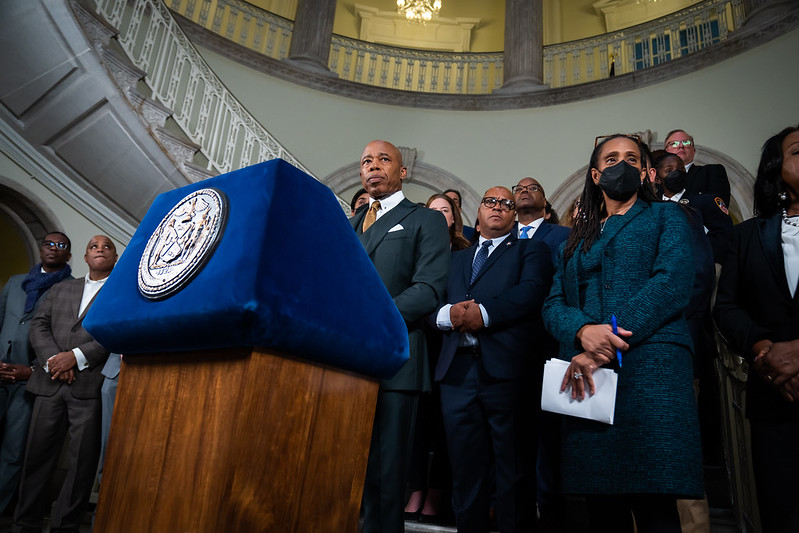
Mayor Eric Adams announces a new pathway forward to address the ongoing crisis of individuals experiencing severe mental illnesses left untreated and unsheltered in New York City’s streets and subways. City Hall. Credit: Ed Reed/Mayoral Photography Office.
Dec. 6, 2022 Op-Ed By NYC Mayor Eric Adams
Our city is facing a crisis. New Yorkers with severe and untreated mental illness are living out in the open, on our streets and in our subways. They are in danger and need help, yet often, the nature of their illnesses prevents them from seeking the support they require.
My Administration is determined to do more to assist people with mental illness, especially those with untreated psychotic disorders who pose a risk of harm to themselves, even if they are not an imminent threat to the public. Moving forward, we will take several key steps.
The most important is for our outreach workers, hospital staff, and police officers to be aware that New York law already allows us to intervene when untreated severe mental illness prevents a person from meeting their basic human needs, causing them to be a danger to themselves.
We will continue to do all we can to persuade those in need of help to accept services voluntarily. But we have also given our mobile crisis teams—comprised of clinicians—specific guidance for involuntarily transporting a person experiencing a mental health crisis to a hospital for evaluation.
This will occur when a person refuses voluntary assistance, and it appears that they are suffering from severe mental illness and are a danger to themselves due to an inability to meet their basic needs. We believe this is the first time that a mayoral administration has given this direction on the “basic needs” standard in official guidance.
Our mobile crisis teams and police officers will also receive enhanced training on how to assist those in mental health crisis. This will include an in-depth discussion of what “inability to meet basic needs” means, and an array of options to consider before resorting to involuntary removal.
We will launch a hotline staffed by clinicians from our H+H hospitals to provide guidance to police officers who encounter individuals in psychiatric crisis as well. The hotline will allow an officer to describe what they are seeing to a clinical professional, or even use video calling to get an expert opinion on what options may be available.
In addition to these steps, we will ask our partners in Albany to make important fixes to the New York State Mental Hygiene Law.
These fixes include a common-sense expansion of the information that a hospital doctor considers in deciding whether to discharge a psychiatric patient. All too often, a person enters a hospital in crisis and is discharged prematurely simply because their current behavior is no longer as alarming as it was when they were admitted.
Our agenda also calls for allowing a broader range of licensed mental health professionals to staff our mobile crisis teams, and for a broader range of trained professionals to perform psychiatric evaluations in hospitals. This will help us get more outreach teams on the ground and enable hospital psychiatrists to spend more time providing medical care directly to patients.
These are just a few of the needs our legislation addresses. We will be doing more to help people with severe mental illness access “assisted outpatient treatment,” and coordinated care.
All these efforts are based on my core conviction that people with untreated severe mental illness deserve care, community, and treatment in the least restrictive setting possible. By helping our brothers and sisters with severe mental illness, my administration will also be protecting the rights of every New Yorker to live, work, thrive and be safe.
To learn more, please see: PsychiatricCrisisCare_v1.indd (nyc.gov)
